3 My 9/11 Story and More
The attacks on the World Trade Center in New York City started way before 2001. This was the first one.
1993 Bombing of the World Trade Center
AI-generated overview from Google Gemini:
On February 26, 1993, a massive truck bomb detonated beneath the North Tower of the World Trade Center (WTC) in New York City. The explosion, which killed six people and injured over a thousand, was the result of a plot by a group of Islamic extremists led by Ramzi Yousef.[1]
The terrorists had rented a Ryder truck and filled it with 1,500 pounds of explosives. Their goal was to collapse the North Tower onto the South Tower, causing both buildings to fall and killing tens of thousands of people. However, the bomb failed to bring down the towers, although it caused significant damage to the North Tower and the surrounding area.[2]
The bombing was a major blow to the United States and a wake-up call to the dangers of terrorism. It also led to a number of changes in security measures at the World Trade Center and other major landmarks.[3]
The 1993 World Trade Center bombing was a tragedy that could have been much worse. It is a reminder of the dangers of terrorism and the importance of vigilance in the face of threats to our safety.
I was at work at Chase in New York City, for both WTC attacks. On the first one 1993, I was in the lower-level cafeteria at 1 Chase Manhattan Plaza when I felt the bomb blast. In this photo below, where the sliver of blue sky in the middle left is where the WTC is located, just off the Hudson River. The employee cafeteria is several levels below this statute (Group of Four Trees, 1972, Jean Dubuffet).
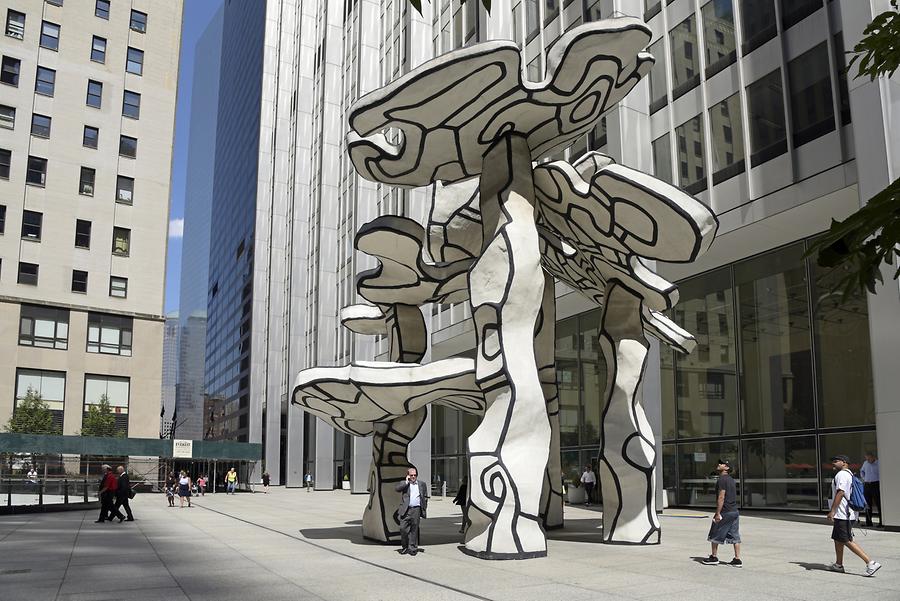
I do not recall there being too much short-term or long-term impacts for me personally from the first attack, as I lived in Staten Island at the time and had no physical connection to or through the World Trade Center.
It is amazing how solid the bedrock of Manhattan Island is – and even though these two sites – 1 Chase Plaza and the World Trade Center – are so close together geographically, they were practically worlds apart for me. I rarely went into the World Trade Center when I lived on Staten Island, and even though Chase had a branch in the lower level, I did not know anyone who worked there or evacuated from there, during the first bombing.
9/11
AI-generated overview from Google Gemini:
The September 11th attacks, also known as 9/11, were a series of coordinated terrorist attacks by the militant Islamist group al-Qaeda against the United States on September 11, 2001.[4]
Here’s a breakdown of the attacks:
- Hijackings: Nineteen al-Qaeda terrorists hijacked four commercial airplanes.[5]
- Targets:
- Impact:
The 9/11 attacks were a watershed moment in American history, leading to the War on Terror, increased security measures, and a renewed focus on national security.[11]
Fast forward eight years later, and my family had moved to New Jersey in 1997. I was taking the New Jersey Transit train into Penn Station and my wife was switching to the PATH train into the WTC (she still worked downtown at another company – and was making her way through the WTC and out the escalators that fateful day, just 45 minutes before the first strike). On Tuesday, September 11, 2001, I was at Chase’s 345 Park Avenue offices in midtown, proudly showing off to colleagues the photo of me golfing with boxer Gerry Cooney, from a charity outing in New Jersey the day before.
That got interrupted with the news that an airplane had crashed into one of the World Trade Center towers. The time was 8:46AM.
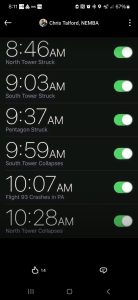
I went into the large conference room we had on the floor where we worked, and got the big screen projector connected to the television broadcast system, just in time to see the second plane strike. We were then told by managers to close the office curtains, and stay away from the windows. My sales team’s leader and two other relationship managers were already on their way downtown for client meetings and we could not reach them. They made it back safely before the first World Trade Center tower collapsed.
I had a lot of challenges reaching my wife by phone, but we did finally connect and met each other at the West Side Piers near the Intrepid and took a ferry back to New Jersey. You can read a much better accounting of this massive evacuation of lower Manhattan in the book American Dunkirk: The Waterborne Evacuation of Manhattan on 9/11 by James Kendra and Tricia Wachtendorf. They also have a website at http://www.americandunkirk.com/.
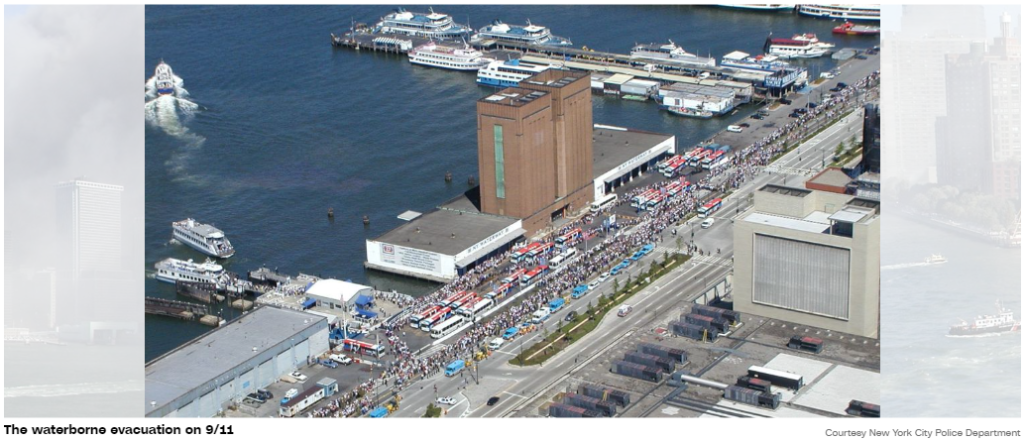
My wife’s 9/11 story is much more dramatic than mine – and candidly, is something she does not talk about to anyone. Everything was a bit of a blur for the next week or so. I really do not remember what work was like for the rest of September and the first week of October, but JPMorgan Chase severed my employment exactly one month later on October 11, 2001. Downsized. Layed off.
Fired.
Chances are this downsizing was in the works before September 11th – again, if you look at making staff cuts as part of a merger and you find folks without champions for them, they are low hanging fruit to pick off. I think that is what happened to me and many others – only these layoffs got delayed by 9/11, but the firm could only wait for so long. The stock market took a major tumble and then the cuts needed to be more severe, more deep thanks in large part to this heinous act of cowardness and evil.
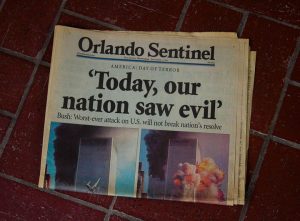
Lessons Learned (sort of)
I really did not have the time to flow through the entire grief cycle stages associated with 9/11, before that new one started for me: being unemployed for the first time in my life. As I noted, I started interning at Chase in my last year of college in 1986, and it was the only full-time job I held since then.
- I did take the anger I had against the attack and started a Community Emergency Response Team (CERT) in my hometown, and
- I also started volunteering with the American Red Cross’ Disaster Action Team; responding to help others who got struck with those small disasters like house fires, on my evenings and weekends.
- I learned that for the rest of my life, at least once or twice a week when I look at a digital clock, it will be reading 9:11. Seriously. And it brings me back to that day, each and every time. I wonder if I am the only one who experiences this.
- I hated that feeling of loneliness and helplessness that occurred for me on 9/11 and the days, weeks and months after. For me, part of the recovery of both incidents (9/11 and getting fired) was to move through them. Like the resiliency of most Americans, we may not get around the disasters which befall us or beyond them, but we do get through any and every crises one way or another. And we never forget.
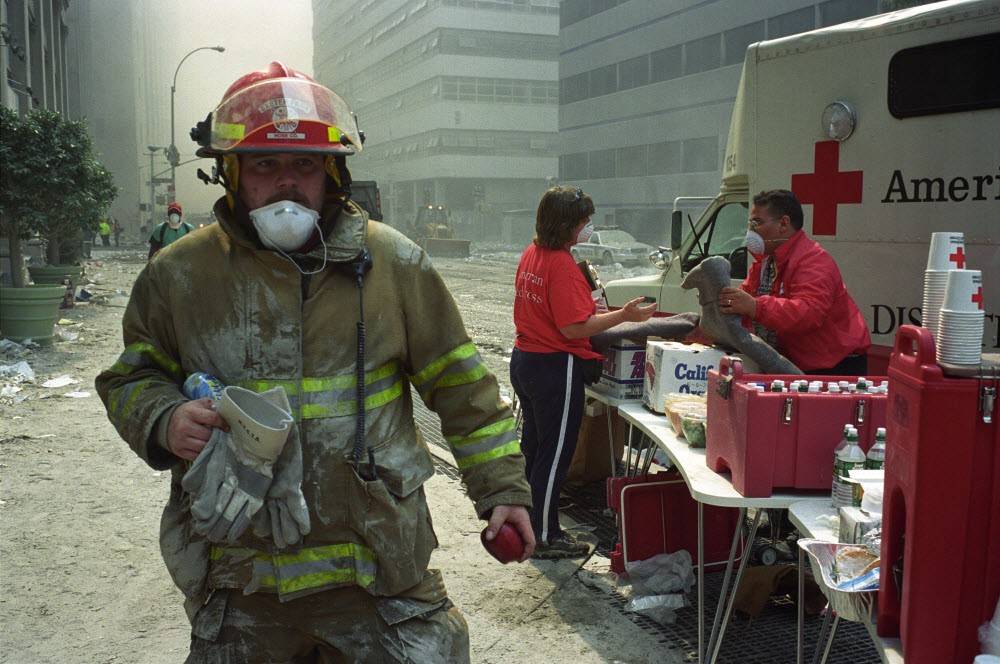
Red Cross DRO Numbers associated with 9/11
| 787 | AA11/UA175 9/01 WTC |
| 788 | AA77 9/01 Pentagon |
| 789 | FWIB Center 9/01 Dallas |
| 790 | UA93 9/01 Somerset, PA |
| 791 | AA11/UA175 9/01 Boston, MA |
| 792 | Airport Support 9/01 USA |
| 793 | AA11/UA175 9/01 Los Angeles, CA |
| 794 | UA93 9/01 San Francisco, CA |
| 795 | WTC 9/01 NJ |
| 796 | World Trade Center 9/01 CT |
| 797 | Blood Support 9/01 USA |
| 798 | WTC Airline Hotline |
| 799 | WTC Family Maintenance Allowance Center |
There were 22 Red Cross chapters in New Jersey in 2001. I learned that the Tri-County chapter where I would later volunteer at and be employed, had a satellite office in Elizabeth which operated reverse commuter shelters for at least three days after 9/11. These were for people who lived in New York City, but worked outside of the city and could not travel back in during and immediately after 9/11.
Post 9/11
Chase had a good severance program, which included some ‘scholarship money’ to switch careers. I used that to take a non-credit college class and got a New Jersey Real Estate license. I also took my self-earned securities licenses (the Series 7 & 63 which were – lucky for me – required by JPMorgan after the merger, for all its sales staff) into a new job at H&R Block Financial Advisors (HRBFA) in various locations in the same NJ county I lived in.
Working at a retail brokerage firm
Candidly, I have to say that I rarely enjoyed that retail brokerage job over the five years I was there. I do not think of myself as a salesperson, and the retail stock brokerage is a very tough business to start a career in – if you have no clients that provide you recurring income (brokerage fees and commissions) you make no money. I do not think I have ever cursed as much out loud as much then or since, as I did while working at that firm. We swore at each other (and about the clients) on days we made money, as well as the many, many days we did not. In many ways, it was like living with a pack of wolves.
Still, that job had some corporate perks, one of which was that they were owned by H&R Block which had a strong community presence and position around the country. My manager put me in for a national community service award and I won it one year. That recognition came with a $5000 award (for me to give away, not to keep) which I allocated part of it to go to the American Red Cross.
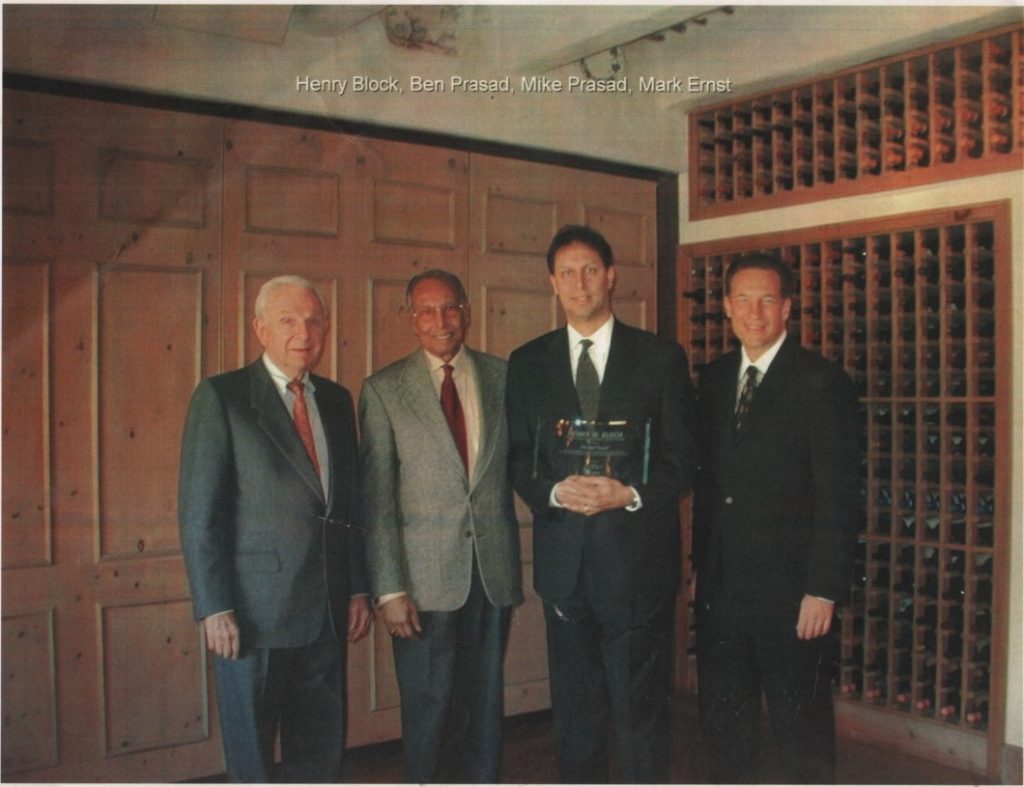
In 2005, I became a Branch Office Manager for HRBFA – and started the commute back into NYC once again. The H&R Block Financial office was in midtown on Park Avenue again, very close to the last Chase office I had in 2001. The Branch Office Manager role has terrible hours and lots of work for little pay. It is still a sales job, only now your main job is trying to poach other brokers (and their books of business) to join your firm. I had to hone my own personal ethics at my own financial peril. It is near impossible to find personal revenue without some level of disservice to the clients. I was miserable.
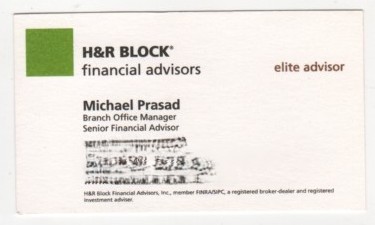
As luck would have it once again, another opportunity came my way – back in New Jersey. There was actually a paid job working for the Red Cross – and one that paid me more than working at HRBFA (and the commute was only six minutes from my house). In 2008, I said ‘yes’ to that Red Cross job in a heartbeat, without looking back. I really had nothing to lose. And while I have visited ‘the city’ probably once or twice on average a year, I have not worked in NYC since kissing that HRBFA job goodbye in 2008. It is no longer a place for me to succeed in – and I now see travelling into NYC only in terms of potential threats and hazards.
I certainly took many of my tech skills and corporate leadership elements from my time at Chase to Emergency Management (we act very similarly as meta-leaders, directing the work of others – who do not necessarily work in the same chain of command – towards a common goal or objective. Usually, these roles require really good teamwork, too). I was hoping to do this Emergency Management work as full-time paid work until I retired, but that bus took a sharp turn off the road, in many ways due to COVID-19. Read on for that part of my story. Currently I am consulting in this field, writing quite a bit, and helping organizations with their crisis action and business continuity planning. These chapters in my story are still being written, but readers will find at least one of them in the ‘After‘ part of this book.
- https://www.fbi.gov/history/famous-cases/world-trade-center-bombing-1993 ↵
- https://www.google.com/books/edition/City_in_the_Sky/wglOAgAAQBAJ ↵
- https://www.pbs.org/newshour/nation/powder-keg-for-9-11-1993-world-trade-center-bombing-remembered-on-anniversary ↵
- https://history.defense.gov/DOD-History/Pentagon/9-11-Attack/ ↵
- https://www.history.navy.mil/browse-by-topic/wars-conflicts-and-operations/sept-11-attack.html ↵
- https://www.cdc.gov/wtc/exhibition/introduction.html ↵
- https://www.defense.gov/Multimedia/Experience/Pentagon-Memorial/ ↵
- https://www.nationalparks.org/explore/parks/flight-93-national-memorial ↵
- https://www.state.gov/22nd-anniversary-of-the-september-11-2001-attacks/ ↵
- https://www.pewresearch.org/politics/2021/09/02/two-decades-later-the-enduring-legacy-of-9-11/ ↵
- https://www.dhs.gov/implementing-911-commission-recommendations# ↵
World Trade Center - in New York City
Community Emergency Response Team
H&R Block Financial Advisors
